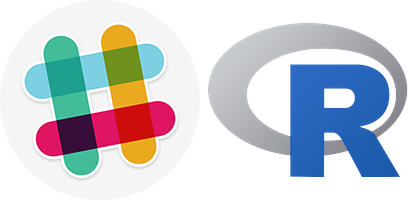slackr - a package to send full & webhook API messages to Slack.com channels/users
Slackr contains functions that make it possible to interact with the Slack messaging platform. When you need to share information/data from R, rather than resort to copy/paste in e-mails or other services like Skype, you can use this package to send well-formatted output from multiple R objects and expressions to all teammates at the same time with little effort. You can also send images from the current graphics device, R objects (as RData), and upload files.
News
- Version
1.3.1.9001Forgotbind_rowsin pkg imports - Version
1.3.1.9000Removeddata.tabledependency (replaced withdplyr); added access toim.list(https://api.slack.com/methods/im.list) thx to PR from Quinn Weber - Version
1.3.0.9000Radically changed howslackrworks. Functions have camelCase and under_score versions - Version
1.2.3added more parameter error cheking, remobved the need for ending?on webhook URL and added defaults for missing setup parameters. - Version
1.2.2fixed issue (bug in1.2.1fix) - Version
1.2.1fixed issue when there are no private groups defined - Version
1.2re-introducedggslackr()(first CRAN version) - Version
1.1.1fixed a bug in the new full APIslackr()function - Version
1.1added graphics & files capability - Version
1.0released
Many thanks to:
for their contributions to the package!
The following functions are implemented:
slackr_setup: initialize necessary environment variablesslackr: send stuff toslack.com(full API token - i.e. not wehbook - required)slackr_bot: send stuff toslack.comusing the incoming webhook API/tokendev_slackr: send the graphics contents of the current device to a toslack.comchannel (full API token - i.e. not wehbook - required)ggslackr: send a ggplot object to aslack.comchannel (no existing device plot required, useful for scripts) (full API token - i.e. not wehbook - required)save_slackr: save R objects to an RData file onslack.com(full API token - i.e. not wehbook - required)slackr_upload: upload any file toslack.com(full API token - i.e. not wehbook - required)slackrUsers: get a data frame ofslack.comusers (full API token - i.e. not wehbook - required)slackrChannels: get a data frame ofslack.comchannels (full API token - i.e. not wehbook - required)slackrGroups: get a data frame ofslack.comgroups (full API token - i.e. not wehbook - required)
The slackr_setup() function will try to read setup values from a ~/.slackr (you can change the default) configuration file, which may be easier and more secure than passing them in manually (plus, will allow you to have multiple slackr configs for multiple Slack.com teams). The file is in Debian Control File (DCF) format since it really doesn't need to be JSON and R has a handy read.dcf() function since that's what DESCRIPTION files are coded in. Here's the basic format for the configuration file:
token: YOUR_INCOMING_WEBHOOK_TOKEN
channel: #general
username: slackr
incoming_webhook_url: https://YOUR_TEAM.slack.com/services/hooks/incoming-webhook?
api_token: YOUR_FULL_API_TOKEN
You can also change the default emoji icon (from the one you setup at integration creation time) with icon_emoji.
Installation
# stable/CRAN
install.packages("slackr")
# bleeding edge
devtools::install_github("hrbrmstr/slackr")Usage
library(slackr)
# current verison
packageVersion("slackr")
slackrSetup(channel="#code",
url_prefix="http://myslack.slack.com/services/hooks/incoming-webhook?")
slackr(str(iris))
# send images
library(ggplot2)
qplot(mpg, wt, data=mtcars)
dev.slackr("#results")
barplot(VADeaths)
dev.slackr("@jayjacobs")
ggslackr(qplot(mpg, wt, data=mtcars))Test Results
library(slackr)
library(testthat)
date()
#> [1] "Thu Jul 30 17:55:48 2015"
test_dir("tests/")
#> testthat results ========================================================================================================
#> OK: 0 SKIPPED: 0 FAILED: 0
#>
#> DONE